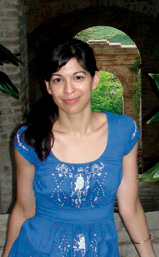Middle Eastern Studies professor wins award to study literary genre
No one has ever studied it before. In fact, most scholars didn’t even recognize its existence.
But thanks to the newly created Humanities Research Award, Karen Grumberg will be the first scholar to investigate the literary genre of Hebrew Gothic.
Grumberg, an assistant professor in the Department of Middle Eastern Studies, is one of 10 College of Liberal Arts faculty members to receive the $15,000 award, established last year by Dean Randy L. Diehl to address the shortage of external grants to fund humanities research.
“It validates my project as an interesting and worthy one,” says Grumberg. “Winning this award confirmed that this is a project that is worth the investment of a good deal of time and energy, and that it can engage people outside my field.”
With so much international attention focused on the Middle East, and Israel in particular, Grumberg’s research could have implications beyond the literary.
Her research on Hebrew Gothic focuses on the writings of European Jews throughout history who were likely exposed to the European Gothic (often identified with dark imagery and evil omens) and who also likely experienced pathological anti-Semitism.
Jews, un-rooted in one place and lacking a homeland, for centuries were considered, in Grumberg’s words, “at best abnormal and at worst parasitical, a foreign, exploitative and corrosive force — a depiction that lay bare the innermost fears of society.”
Grumberg aims to examine the seemingly ironic adaptation of Gothic characteristics by Hebrew authors and poets in order to understand how they negotiated Jewish fears in Europe, and how these fears were transformed by the territorialization of Hebrew with the establishment of a national Jewish homeland. In other words, if European Gothic depicts Christian Europe as the victim and the Jew as the threat, then how are these categories translated into Hebrew Gothic?
“This question is significant particularly in the current volatile political context, in which Israel sees itself as another incarnation of the victimized Jew,” Grumberg says.
Grumberg’s work is starting to receive recognition in her field. Kristen Brustad, chair of the Department of Middle Eastern Studies, believes Grumberg’s strength in literary theory and comparative literature will help increase the department’s national prominence.
She will help the department create and build a field of comparative Middle Eastern literatures, which will replace the traditional model of separate Arabic, Hebrew, Persian and Turkish literature fields, says Brustad.
“Karen has been at the center of this movement from the outset, and as her reputation spreads, we expect that she will attract the top students in the country to study Hebrew, Israeli and Middle Eastern literatures,” Brustad says.
With so many resources devoted to science, technology, engineering and mathematics (the so-called STEM fields), funding for the humanities is often pushed aside. But the Humanities Research Award shows that the College of Liberal Arts and the university support faculty in the humanities and that they acknowledge the value of humanities research.
“Humanities scholarship is a critical part of the mission of the College of Liberal Arts, and in times of budgetary difficulties it is especially important for the college to help underwrite excellent scholarship,” Diehl explains.
“Ultimately, this and other humanities awards contribute to the long-term health and strength of the university as a whole,” Grumberg says.
